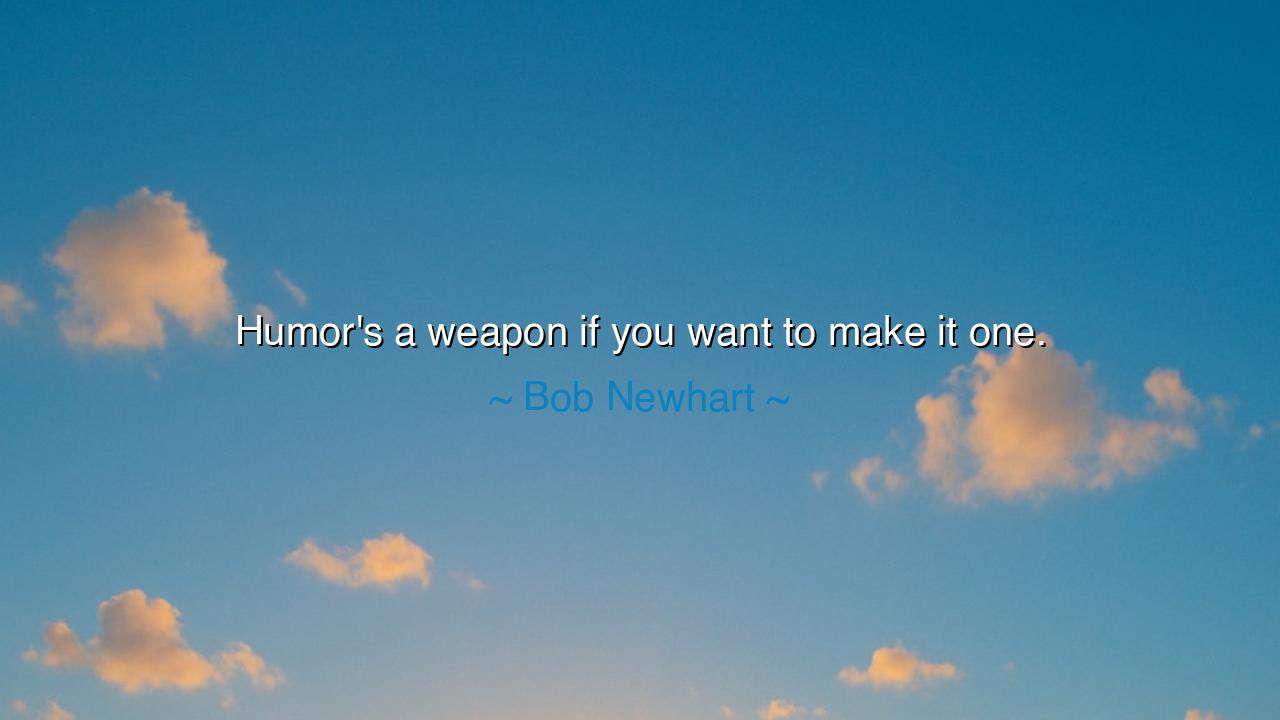
Humor's a weapon if you want to make it one.






Hear the words of Bob Newhart, the quiet master of laughter, who once said: “Humor’s a weapon if you want to make it one.” Though his voice was gentle and his comedy subtle, his wisdom cuts deep. For he speaks not only of jokes and laughter, but of power—the hidden strength that lies within the art of humor. It is a truth the ancients knew well: that the tongue can heal or wound, and that laughter, too, can be a sword or a balm. In this brief saying, Newhart reveals the dual nature of humor—it can defend, inspire, and unite, or it can mock, divide, and destroy. The choice, he reminds us, rests with the heart that wields it.
To understand his words is to understand the sacred balance between wit and wisdom. Humor, when born of kindness, can uplift the weary, expose hypocrisy, and disarm hatred. It can transform fear into courage, conflict into conversation. But when guided by cruelty, it becomes a weapon of scorn—a sharp arrow aimed at the dignity of others. Thus, Bob Newhart, who built his art upon gentleness and humility, warns us: laughter itself is neutral, but its intent is not. It is not the sound of laughter that defines its worth, but the spirit behind it. The wise must therefore learn to wield it carefully, as a warrior handles his blade—with precision, not recklessness; with purpose, not pride.
The ancients spoke often of this same truth. Aristophanes, the great playwright of Athens, wielded comedy like a sword dipped in honey. Through laughter, he dared to challenge kings and question war. His humor, though filled with mischief, carried the weight of truth. The audience laughed—but in their laughter, they saw themselves revealed. And centuries later, in another age, Mark Twain would do the same, using humor as a weapon against hypocrisy and injustice. With a smile, he unmasked greed and arrogance, showing that laughter can pierce deeper than anger ever could.
History, too, gives us darker lessons. There were those who turned humor into a tool of cruelty—mockery used to humiliate, satire used to wound. Tyrants have often laughed at the suffering of others, mistaking their laughter for strength. But true humor, as Newhart teaches, is never born from contempt. His own style of comedy—measured, thoughtful, human—was an act of resistance against cruelty. In a world where comedians often sought power through aggression, Bob Newhart’s quiet wit reminded audiences that laughter can teach without shouting, and heal without humiliating. His humor was not a sword that slashed—it was a light that revealed.
The origin of this wisdom lies in the understanding that humor is deeply tied to truth. The comedian, like the philosopher, holds a mirror to the world. But where the philosopher writes with solemnity, the humorist writes with laughter. Both reveal what is hidden; both challenge what is false. Yet laughter, being lighter, often travels farther—it crosses boundaries that argument cannot. This is why humor, when used wisely, becomes one of humanity’s most powerful forces for change. It can unmask corruption more swiftly than reason, for no tyrant can survive being laughed at. To be ridiculed truthfully is to lose the illusion of power. Thus, humor becomes the weapon of the powerless—the voice of courage in a fearful age.
Consider the tale of Charlie Chaplin, whose silent films brought laughter during the darkest days of oppression. In The Great Dictator, Chaplin mocked tyranny itself, transforming fear into laughter and laughter into defiance. His humor struck at cruelty not with hatred, but with humanity. When the world trembled under despotism, his comedy became a weapon of light, showing that laughter, when guided by conscience, can conquer even the shadows of hate. This is the essence of Newhart’s truth: humor, though soft in sound, can move mountains when wielded with purpose.
So let this be the lesson, passed down as a teaching for all ages: choose the spirit of your humor. Ask yourself, when you speak in jest—does your laughter build or break? Do your words make hearts lighter, or leave wounds behind? Use humor not to mock but to illuminate, not to wound but to awaken. For laughter is a flame—gentle in its warmth, destructive in its misuse. If you would wield it as a weapon, wield it against ignorance, arrogance, and fear—but never against the fragile hearts of others.
Thus remember the wisdom of Bob Newhart: “Humor’s a weapon if you want to make it one.” It can cut through deceit, defend the oppressed, and reveal the truth that solemnity alone cannot reach. But wield it with reverence. For the tongue, once loosed in mockery, can do more harm than any sword. Let your laughter be wise, your wit compassionate, and your humor guided by the light of understanding. For when laughter is used to serve truth and love, it ceases to be a weapon—it becomes a form of grace, a song of freedom that echoes through the ages.






AAdministratorAdministrator
Welcome, honored guests. Please leave a comment, we will respond soon